

Purchase
The Strange and Brilliant Life of Robert "Believe It or Not!" Ripley
Crown Archetype
May 2013
On Sale: May 7, 2013
432 pages
ISBN: 077043620X
EAN: 9780770436209
Hardcover
Add to Wish List
Non-Fiction
A Curious Man is the marvelously compelling biography
of Robert “Believe It or Not” Ripley, the enigmatic
cartoonist turned globetrotting millionaire who won
international fame by celebrating the world's strangest
oddities, and whose outrageous showmanship taught us to
believe in the unbelievable.
As portrayed by
acclaimed biographer Neal Thompson, Ripley’s life is the
stuff of a classic American fairy tale. Buck-toothed and
cursed by shyness, Ripley turned his sense of being an
outsider into an appreciation for the strangeness of the
world. After selling his first cartoon to Time
magazine at age eighteen, more cartooning triumphs
followed, but it was his “Believe It or Not” conceit and the
wildly popular radio shows it birthed that would make him
one of the most successful entertainment figures of his time
and spur him to search the globe’s farthest corners for
bizarre facts, exotic human curiosities, and shocking
phenomena.
Ripley delighted in making outrageous
declarations that somehow always turned out to be true—such
as that Charles Lindbergh was only the sixty-seventh man to
fly across the Atlantic or that “The Star Spangled Banner”
was not the national anthem. Assisted by an exotic
harem of female admirers and by ex-banker Norbert Pearlroth,
a devoted researcher who spoke eleven languages, Ripley
simultaneously embodied the spirit of Peter Pan, the
fearlessness of Marco Polo and the marketing savvy of P. T.
Barnum.
In a very real sense, Ripley sought to remake
the world’s aesthetic. He demanded respect for those who
were labeled “eccentrics” or “freaks”—whether it be E. L.
Blystone, who wrote 1,615 alphabet letters on a grain of
rice, or the man who could swallow his own nose.
By
the 1930s Ripley possessed a vast fortune, a private yacht,
and a twenty-eight room mansion stocked with such “oddities”
as shrunken heads and medieval torture devices, and his
pioneering firsts in print, radio, and television were
tapping into something deep in the American consciousness—a
taste for the titillating and exotic, and a fascination with
the fastest, biggest, dumbest and most weird. Today, that
legacy continues and can be seen in reality TV, YouTube,
America’s Funniest Home Videos, Jackass, MythBusters
and a host of other pop-culture phenomena.
In the
end Robert L. Ripley changed everything. The supreme
irony of his life, which was dedicated to exalting the
strange and unusual, is that he may have been the most
amazing oddity of all.
Comments
No comments posted.
Registered users may leave comments.
Log in or register now!
| 


 © 2003-2025 off-the-edge.net
all rights reserved Privacy Policy
© 2003-2025 off-the-edge.net
all rights reserved Privacy Policy